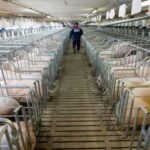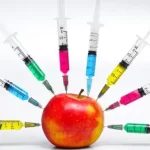Largest Pork Producer in the U.S. Now Owned by $22 Billion Chinese Meat Processing Company
The post Largest Pork Producer in the U.S. Now Owned by $22 Billion Chinese Meat Processing Company appeared first on Healthy Holistic Living.
Smithfield Corporation, the largest pork producer in the United States, is a household name when it comes to processed meats. However, many consumers are unaware that the company was purchased in 2013 by WH Foods, a $22 billion Chinese meat processing corporation. This acquisition has sparked concerns about the implications of foreign control over a major player in the American food industry, as well as the environmental and social consequences of Smithfield’s factory farming practices.
Background and Acquisition
The Smithfield Corporation, headquartered in Smithfield, Virginia, is known for its sausages, roasts, ribs, bacon, and more. In 2013, it was purchased by WH Foods of China, a company that generated $22.3 billion in revenue in 2017. The acquisition allowed WH Foods to expand its global presence and secure a steady supply of pork for the Chinese market, which has been affected by African swine fever and a decline in pig population. Smithfield does not disclose the exact amount of meat it exports to China, but the company sold about 38.8 million pounds of pork to the country during a few months.
Environmental Consequences
Smithfield Foods’ factory farming practices have come under scrutiny for the environmental damage they cause. In 2017, drone footage revealed a large, football-stadium sized “lake” filled with pig urine and feces at the company’s largest pork farming facility. The footage, secretly recorded by Mark Devries as part of his investigative documentary, “Speciesism: The Movie,” exposed the harsh conditions in which pigs are raised, cramped together in long buildings and unable to move. The waste generated by these factory farms is disposed of by spraying it into the air, which has a detrimental impact on the surrounding environment.
The Environmental Protection Agency (EPA) has also cited Smithfield Foods for violations of the Clean Water Act. In 1997, the company was fined $12.6 million for discharging pollutants into the Pagan River in Virginia. Despite these incidents, Smithfield maintains that its practices adhere to regulations and that its facilities are clean and well-maintained.
Social Implications
The communities surrounding Smithfield’s factory farms are predominantly low-income families, who bear the brunt of the pollution and health risks associated with these practices. Dr. Steve Wing of the University of North Carolina explains that the waste sprayed into the air can drift into neighboring communities, causing respiratory issues and other health problems. Studies have found higher rates of asthma and respiratory symptoms among children and adults living near these facilities.
These communities often lack the resources to fight back against a large corporation like Smithfield. They are forced to endure the unbearable smell and live with closed doors and windows to minimize exposure to the toxic waste. The social injustice faced by these communities sheds light on the broader issue of environmental racism, where marginalized populations are disproportionately affected by pollution and environmental hazards.
Economic Implications and Historical Context
The acquisition of Smithfield by WH Foods raises concerns about foreign control over a significant portion of the American food supply. Similar concerns arose in the 1980s when Japanese companies began purchasing American businesses, including the iconic Rockefeller Center in New York. Critics argue that foreign ownership of critical industries can undermine national security and economic stability.
However, proponents of globalization point to the economic benefits of foreign investment, including job creation and increased trade opportunities. In the case of Smithfield, the acquisition has expanded the company’s reach in the global market and provided a steady stream of revenue from Chinese consumers.
The purchase of Smithfield Corporation by WH Foods has brought attention to the environmental, social, and economic implications of foreign ownership in the American food industry. The factory farming practices employed by Smithfield have caused significant environmental damage and negatively impacted the health and quality of life of surrounding communities. These issues highlight the need for increased regulation and oversight to protect both the environment and the well-being of those affected by the industry’s practices.
Furthermore, the acquisition has sparked concerns about foreign control over critical industries in the United States. While foreign investment can bring economic benefits, it is essential to carefully weigh these advantages against potential risks to national security and economic stability.
The Smithfield case serves as a cautionary tale, illustrating the importance of transparency in the food industry, as well as the need for greater corporate social responsibility. Consumers have the power to demand change through their purchasing choices, by supporting companies that prioritize sustainable, ethical, and environmentally-friendly practices. As awareness of the hidden costs of factory farming and foreign ownership grows, it is crucial for both policymakers and consumers to take action to protect the environment, ensure food security, and promote social justice.
The post Largest Pork Producer in the U.S. Now Owned by $22 Billion Chinese Meat Processing Company appeared first on Healthy Holistic Living.












